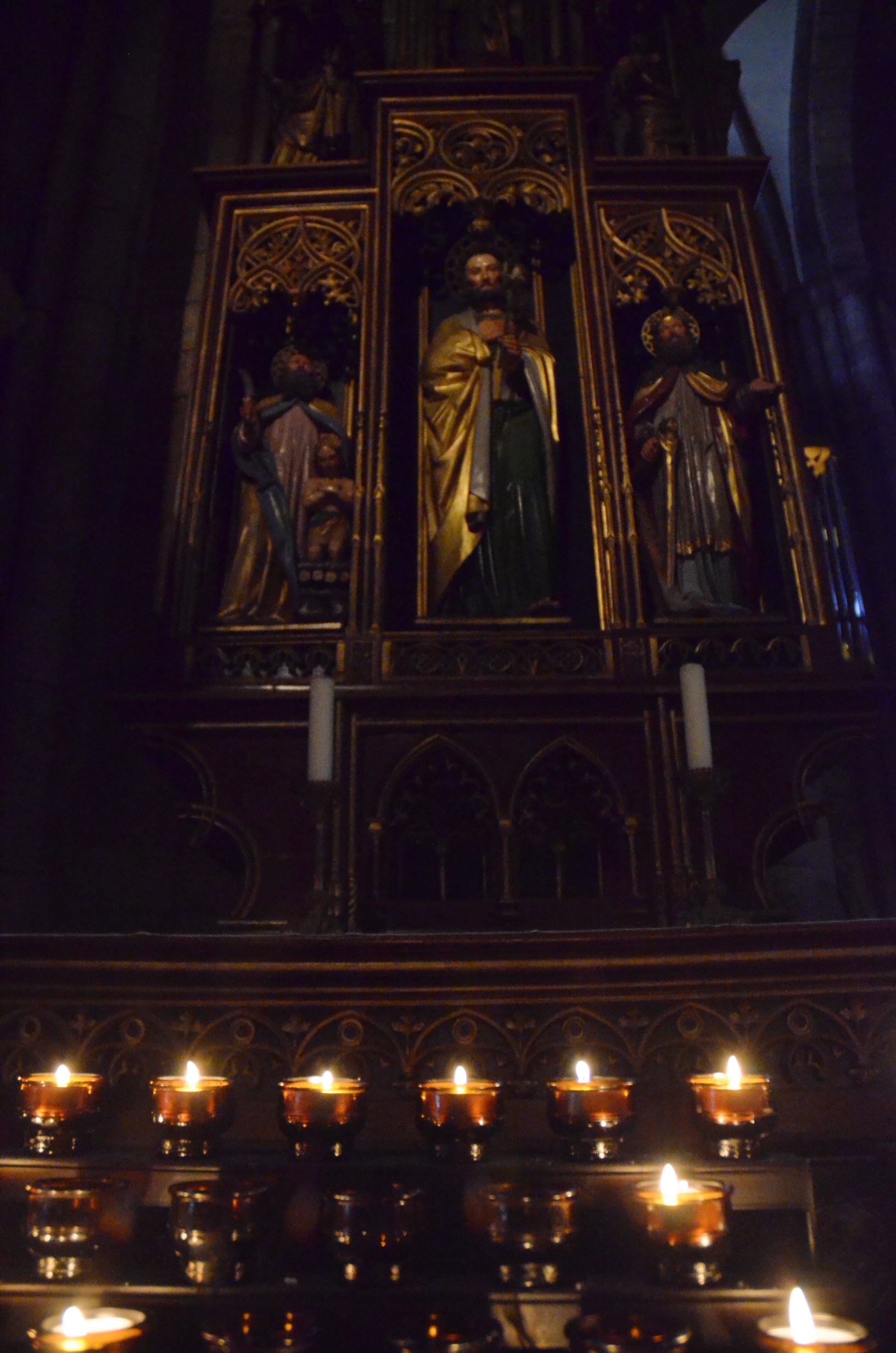I am finishing off my paper for the 2013 IOTS Conference to be held in just over two weeks. I will be speaking “On Exegetical Similarities between the Targumim of the Megilloth” and in the course of my research I was reading Tg Qohelet again. The Targum transforms this nihilistic text into a treatise on obedience to Torah and rabbinic virtues, but I was struck by this passage in the biblical text.
2 It is better to go to the house of mourning
than to go to the house of feasting;
for this is the end of everyone,
and the living will lay it to heart.
3 Sorrow is better than laughter,
for by sadness of countenance the heart is made glad.
4 The heart of the wise is in the house of mourning;
but the heart of fools is in the house of mirth.
Even before our son died, this sounded somewhat platitudinous to me; out of touch with the real depth of loss and grief that such loss brings. I know better, since one thing that a decade and a half of researching and writing on the Book of Lamentations, the rabbinic response, and ancient lament in general taught me was that loss of life and loved ones, hardship and deprivation were constants in antiquity. Even for those fortunate enough to have some power and position, they were not exactly living like the Duke and Duchess of Cambridge (baby arriving even as I type). Yet to say “sorrow is better than laughter” suggests to me that the author hasn’t really experienced sorrow.
Unless they have. This is the paradox of loss such as ours. We would do just about anything to bring Mack back. One really cannot understand it unless you have been through it. And yet, going through this certainly does change you dramatically. Now the question is how we allow it to change us. I could, as I know others have, allow this to confirm that there is no justice in the world and thus no God, certainly not the God of the Bible. I know more than a few “foxhole atheists.”
Or we can take in the larger framework of life. While Mack lived, we were full of the joyous day-to-day of his and his sister’s activities. Now we continue to live in the joy of our daughter’s life, but our horizon has been extended. As my wife regularly says, our world is bigger now, our lives are larger. Mack has gotten there before us, but we will join him in life that is so much more than this time we have right now, in this mortal realm.
The Targumist takes this same perspective as he expanded upon verse two.
It is better for a man to go to the house of a mourner to comfort him than to go to a wine tavern of mockers. For it is the end of all men to go to the house of mourning. For against all of them the decree of death is decreed and because he goes to the house of mourning, the righteous will repent and take to heart the matters of death, and if he has anything evil in his hand, he will leave it and turn in repentance before Master of the World.
I think the Targumist is correct in saying that Qohelet is telling us that we must face our mortality if we are to find true contentedness. I don’t think we can call this “happiness” and I am not even sure that “glad” of verse 3 is the right sense (it is יִיטַב לֵב in MT). In confronting the fact that all of us will die we have to consider what is our ultimate end and goal. If we refuse to confront the horror and loss (running away to the “house of mirth”) then we will never grow, we will never overcome the loss, and we will be poorer for it. Our lives are bigger now because of Mack’s life and death. We would give anything if it were not.
A good friend shared Nicholas Wolterstorff’s Lament for a Son. The great theologian and his wife lost their son Eric in a mountain climbing accident when he was twenty-five. It is a good book in many ways. It is not a guide to grieving, other than what we can learn by watching and sharing in his lament. (I had not realized it until my friend gave the book to me and it was suggested that my blog is much the same. Apparently.) Regarding our need to confront our son’s death, to look fully upon this tragedy and not look away he wrote the following.
I skimmed some books on grief. They offered ways of not looking death and pain in the face, ways of turning away from death out there to one’s own inner “grief process” and then, on that, laying the heavy hand of rationality. I will not have it so. I will not look away. I will indeed remind myself that theres more to life than pain. I will accept joy. But I will not look away from Eric dead. Its demonic awfulness I will not ignore. I owe that—to him and to God.
Qohelet and I say, “Amen.”






5 thoughts on “By sadness of countenance the heart is made glad?”
One of the great highlights of my seminary education was studying Qohelet with Bill Brown who is now at Columbia Seminary in Decatur. I now count Qohelet/Ecclesiastes as one of my favorite books of the Bible.
Without pretending to gloss over the exegetical difficulties one of the key premises (or observations) of the book is, Everybody dies. Everybody. And not only that (here is another key observation), No one knows what will happen tomorrow. (All that money, wisdom, life you have today can be gone in an instant.)
So Qohelet asks, Given this, given the hebel of existence, what then? How do we live in light of the fact that everyone dies, we don’t know what will happen tomorrow, and no one really understands what God is up to? It is a profoundly existential book.
The answer, properly understood, and this is why I am so thankful to Bill Brown, is not pessimism or despair. Qohelet seems to say, Enjoy the life you have today – it can all be gone tomorrow. Eat, drink, share, work hard, but take time to enjoy friendship and family, money and wisdom have their uses, but they are a “shade” (both shadow that gives some relief, but also ephemeral and ultimately impermanent – this is from my paper for the course), receive and be thankful for moments of joy that God gives in our *work* (highly significant) as well as sabbath/rest/friendship/family time.
I think that is the background against which to interpret Ecclesiastes 7. Wisdom, and ultimately appreciation for true joy in life, is found by looking death squarely in the eye. A recent newspaper article on an Orthodox Christian mission in St Francsville quotes the priest saying his job is to help people prepare for death. It sounds morbid, but Qohelet would say no, actually that is where we discover true joy, by living in light of the reality of death (and the highly transitory nature of existence).
And of course Ecclesiastes isn’t just a collection of statements, in a way it records a journey. What is “true” in chapter 7 (and it is true, relatively speaking) might need to be reevaluated in light of chapters 8-12.
As always a profound and excellent post, Chris. I continue to thank God for the gift of knowing you and your family.
Thanks Rick, as always a lot of great thought, reflection, and insight. I still think that Ecclesiastes is essentially a Gedankenexperiment. But that is another post.
Christian – Thank you for sharing these transcending insights.
Some of this juxtaposition of mirth and mourning, and of life and death, reminded me of this … Moments after President John Kennedy died, Washington newspaper reporter and Kennedy friend Mary McGrory had this poignant exchange with Daniel Patrick Moynihan, who was at the time a staff member in Kennedy’s administration …
McGrory: “Pat, we will never laugh again.”
Moynihan: “Oh, Mary, sure we will laugh again. But it is just that we will never be young again.”
Perhaps some of Moynihan’s mourning sentiment was also captured in this Irish lament with musical origins from the 14th century:
Youth must in time decay
Eileen Aroon
Beauty must fade away
Eileen Aroon.
Castles are sacked in war
Chieftains are scattered far
Truth is a fixed star
Eileen Aroon.
Beautiful Daniel and Moynihan’s response is so true. We are much older now than we were 7 months ago. Clearly you love poetry and your Irish roots. Wonderful lament, closing, as so often they do, with a note of hope, “truth is a fixed star.”